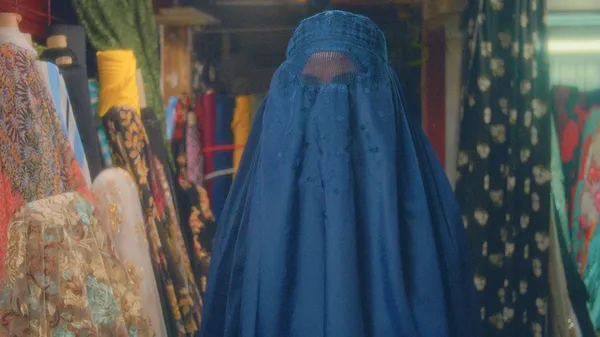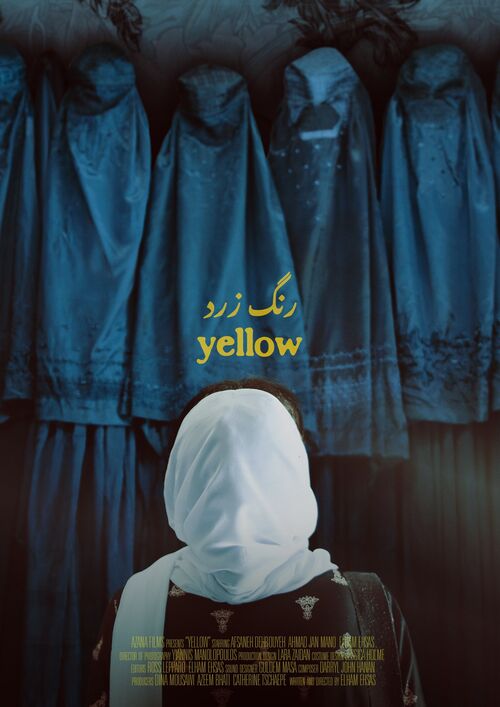Eye For Film >> Movies >> Yellow (2023) Film Review
Yellow
Reviewed by: Jennie Kermode

The wearing of the chadari is an age-old tradition in Afghanistan, claims the man on the news. It is a part of Afghan culture. It’s only natural that that Taliban, for whom he speaks, should want to restore it. The entrance to the shop where Laili (Afsaneh Dehrouyeh) goes to buy her first chadari, now that they are mandated by law, is surrounded by bright colours. Silk scarves flutter; vibrant patterns catch the eye. A yellow canary sings inside a cage. Stepping into the shop, she is confronted by a rack of identical-looking blue chadaris. The camera lingers on them for a fraction too long, forcing viewers to share her discomfort, the sense that the promise of this place has been stolen.
The strains of a rubab call her – and our – attention to the back room. It’s a traditional melody, now – as the shopkeeper (played by director Elham Ehsas) as cautioned by an older man – forbidden music. The room is full of beautiful clothes, the real legacy of Afghanistan’s rich cultural heritage, sold now only for wearing out of sight of strangers. They’re the sort of things which locals and outsiders alike might covet, but Laili must instead purchase one of the drab blue garments. When she puts it on, it looks like a tent, and she struggles to find the mesh through which to look out. “This one is faulty. I couldn’t see anything,” she says – and is told that she’ll get used to it.

There are no speeches here; beyond what we hear on the news, there is no discussion of politics. Laili and the shopkeeper discuss sizing, positioning, practical things. She tells him the names of various colours in English, and he laughs, trying to copy her pronunciation, and we remember that if the Taliban continue to have their way, she will never use her education again. Some women are refusing to wear chadaris, the man on the news says. Their male guardians will be held responsible. It’s a lot harder to take a bold political stance when it is one’s loved ones who are placed at risk.
Ehsas’ short film is full of small observations. Laili and the shopkeeper flirt a little, awkward but smiling, and one wonders what might have been. This could be the last time she ever leaves her home without a male guardian. She asks him to take a photograph so she can see what she looks like, unable to make out her image in the mirror through the mesh, and he does so without thinking. It is haram, of course, to a Talib. In the middle of the film comes a striking dance sequence, the music now presumably just in Laili’s head. Such is her fury that even the fabric of the chadari succumbs to it, moves with her, becomes a tool for her expression, but it is a private dance. Through its polite small talk and what goes unsaid, the film screams out for justice for Afghan women. The silence at the end of it all is deafening.
Reviewed on: 04 Jun 2023If you like this, try:
Coffined At 15Learning To Skateboard In A Warzone (If You're A Girl)
The Red Suitcase

















